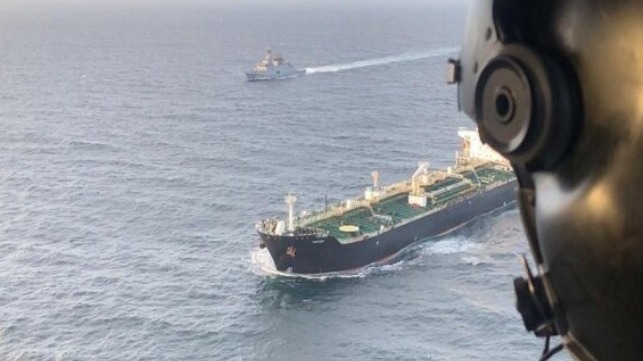Tehran Admits Seized Gasoline Cargoes Were Iranian-Produced

After days of denial, the government of Iran has admitted that it was the shipper of the four cargoes of gasoline that were seized by the United States earlier this month.
“The cargoes were loaded from Iran, but neither the ships nor the cargoes belonged to Iran,” said Iranian oil minister Bijan Namdar Zanganeh at a briefing Monday. “The fuel was Iranian, but it had been sold to Venezuela."
Earlier public statements by the Iranian government focused on the flag and ownership of the vessels in question - none of the four ships were Iranian - and some also suggested that the fuel did not belong to Tehran.
"Sadly for [the U.S.], stolen booty wasn't Iran's. Fuel was sold F.O.B. Persian Gulf. Ship and flag weren't ours either," wrote Iranian foreign minister Mohammed Javad Zarif in a social media message last weekend. "Hollow, cheap propaganda doesn't deflect from miserable failure of US diplomatic malpractice."
Iranian President Hassan Rouhani sounded a similar theme Saturday, though he did not discuss the origin of the cargo. "The ships that the United States seized and claimed to be Iranian were not Iranian and did not carry Iran’s flag," Rouhani said, according to state-owned Mehr News. "This lie was to cover up the shame inflicted on the United States in the Security Council after rejecting its draft resolution to extend the [arms] embargo on Iran."
Vice Adm. James Malloy, commander of U.S. Fifth Fleet, told Bloomberg on Monday that the cargoes were transferred to U.S.-chartered tankers while at sea, ending ambiguity over whether the four target vessels would be carrying the fuel directly to a U.S. seaport. Two of them carried out ship-to-ship transfers in the vicinity of Mozambique, and the other two handed over their cargoes in the Gulf of Oman.
Malloy insisted that Iran's armed boarding of the tanker Wila last week was materially different from the U.S. seizures. He claimed that the Iranian boarding team had stolen equipment from the Wila and assaulted the crew. Previous reports indicate that the Wila boarding was carried out in retaliation for the U.S. fuel seizure: the Wila's ship manager shares a Piraeus address with the manager of two of the tankers that handed over their cargoes, the Bering and the Pandi.
The fuel seizure will likely have negative repercussions for Venezuela's energy supplies. Venezuela has the world's largest oil reserves, but its refineries are functioning at a small fraction of normal capacity, and opposition politicians report that gasoline supplies are running desperately low. A combination of government mismanagement and tightly-enforced U.S. sanctions make it unlikely that the shortages will be alleviated without external assistance, and Iran is one of the few nations willing to provide direct aid. A previous Iranian shipment which arrived in May has largely been exhausted, according to Venezuelan National Assembly (AN) Deputy Omar González.
"The [fuel] that still remains in the tanks of Petróleos de Venezuela (PDVSA) is reserved for those who are [connected] and to be sent to Cuba," Gonzalez told Impacto Venezuela. “It is unusual that while Venezuelans spend days in [gas station] queues and are denied the possibility of filling gasoline, they send boats full of fuel to move the luxurious cars of the leaders of the Cuban dictatorship."
